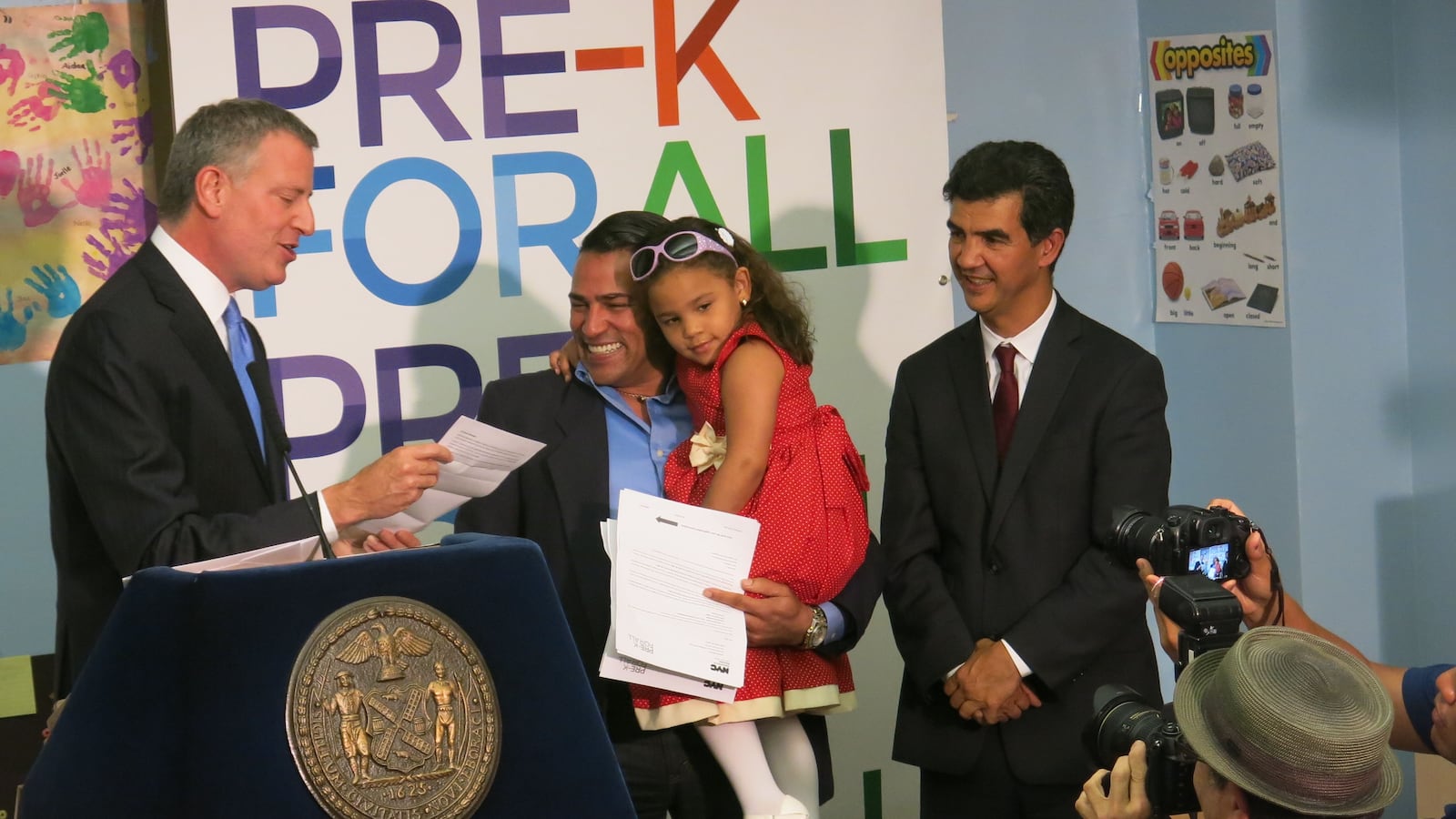Results are in: Children placed in one of the city’s free pre-K classrooms are likely to show skills linked to positive outcomes long-term. That’s according to two national assessment tools, results from which Mayor Bill de Blasio’s administration announced Friday.
Children in the vast majority of these programs are more likely to demonstrate reading, math, and social skills, such as using expanded vocabulary, understanding shapes, and showing independence.
Roughly 95 percent of city programs that were evaluated met or exceeded the threshold that predicts positive student outcomes under the Early Childhood Environmental Rating Scale—Revised. It represents a 7 percentage point increase since 2016-17. This rating scale looks at how classrooms are set up to provide instruction. It also evaluates whether a space is clean and well-maintained with child-size furniture. Also factored in: whether meals and snacks are well-balanced, and whether children’s work is displayed throughout the room.
Additionally, 99.8% of pre-K sites met at least one of three thresholds for positive student outcomes under the Classroom Assessment Scoring System during the 2018-19 school year. That’s up nearly 1 percentage point since 2016-17. This tool looks at the quality of interactions between teachers and students and how well kids are emotionally supported. It zooms in on whether teachers are sensitive and responsive to students’ perspectives and work to create a positive classroom environment.
“The city’s steady progress on key indicators of pre-K instructional quality is very encouraging,” Bank Street College President Shael Polakow-Suransky, said in a statement, “and is the result of the deep work on the part of teachers, coaches, principals, center directors and the Division of early childhood to build strong professional learning communities.”
Most children in the city’s free pre-K program — serving some 70,000 children who turn 4 during the calendar year — attend schools run by community organizations. Teachers in these programs have historically been paid far less than their counterparts in classrooms run by the education department. Those providers have recently warned that the quality of programs would sag if the city didn’t close the wage gap, which could exceed $15,000 for starting teachers. Mayor Bill de Blasio and City Council members recently struck massive deals to narrow those disparities.
The results released Friday reflected well on the pre-K initiative, the education achievement de Blasio touts most often.
“The first and most important thing is kudos to the Department of Education for collecting this data because many programs don’t, and it’s the only way for improvement to occur,” said Ellen Frede, co-director at the National Institute for Early Education Research at Rutgers University.
She added, “Could it be better? Yes. That’s the whole idea. We don’t collect the data to just feel good about the program. We do it to improve the program.”
But she said the results aren’t the only metric parents should consider. It’s even more important for them to visit pres-K classrooms, observe the interactions between teachers and students, and see the social-emotional learning is going on there, according to Frede. “I’m a firm believer in spending some time in the program, and asking, ‘Would I be happy if I were spending six hours a day here?’ ‘Would I have opportunities to play with my friends?’ ‘Would I be safe?’” she said.
The city said it has already seen tangible results from the program, based on third-grade state test scores last year from the first group who entered the city’s expanded pre-K program when it launched in 2014. Third-grade students who attended the city’s free pre-K programs outperformed students who did not. In addition, the gaps in test scores between white and black students and between white and Hispanic students were narrower for students in universal pre-K programs compared to those who were not in such programs.
“We know that when students get in the classroom at a younger age, they are set up for academic success in later years, and this is evidence that in New York City, Pre-K for All is a strong foundation for our students,” Schools Chancellor Richard Carranza said in a statement.
The city’s free public pre-K programs save New York City families an average of $10,000 per year on childcare costs, city officials say.
Families are applying to that program can do so now through Mar. 16.
The city also runs a free pre-K program for 3-year-olds, which will be in 16 of its 32 school districts this September. It is expected to serve an estimated 26,000 children. Applications for 3-K remain open until Apr. 24.

